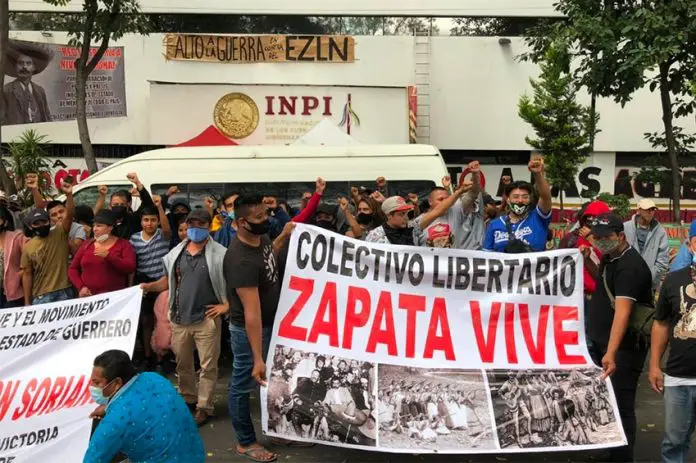For over two weeks, members of the Otomí community of Mexico City have occupied the offices of the National Institute of Indigenous Peoples (INPI) and maintain that they will not leave until authorities resolve their demands for better living and working conditions during the coronavirus pandemic.
The group of around 120 Otomí families has demanded that Mayor Claudia Sheinbaum and INPI director Adelfo Regino Montes end what they see as the government’s longtime neglect of the community and attend to their basic human rights, including access to water and housing.
The protest began amid large mobilizations on October 12 by indigenous groups around the country condemning the celebration of the anniversary of Christopher Columbus’s arrival in the Americas.
“It is time to raise our voices and not remain silent. For 528 years, they have oppressed us, they have dispossessed us, as if to leave us another 528 years more, ”said Maricela Mejía, an Otomí spokeswoman and member of the Indigenous Governing Council (CNI), a national organization that advocates on behalf of indigenous peoples.
The INPI, a federal agency, has called for a roundtable with the Otomí community to address the housing issue, a call that the Otomí have accepted.
At a press conference on Tuesday, Otomí representatives accepted Regino’s proposal, yet with the condition that he and Sheinbaum attend in person on November 3 at the INPI offices. “If they do not come that day for the dialogue we will begin to remove items from the building such as the agency’s archives and office equipment,” threatened Mejía.
Many of the families have lived in destitute conditions in makeshift structures like tents around three properties in the gentrifying neighborhoods of Colonia Roma and Colonia Juárez at Guanajuato 200, Roma 18, and Zacatecas 74. They argue that the Mexico City government has prioritized plans for real estate development over their wellbeing.
On multiple occasions in recent years, the real estate companies that own the properties have evicted the settlements, forcing the Otomí residents onto the streets.
“… there are companies that tell us that we look bad on public roads and as a result they cannot sell their apartments, or they try to bribe us to leave,” said Otomí artisan Elvira Isidro Eduardo.
The community has initiated multiple processes with the Mexico City government to legalize their housing situation, which would provide some families with low-income housing, as well as expropriate some of the properties and construct housing that residents would eventually pay off through loans. Yet authorities have shown little interest in advancing the negotiations and the coronavirus pandemic has put some of them on hold.
The Otomís’ absence in official population counts due to their illegal and informal housing situations accounts in part for their neglect by the government. In June, the nongovernmental organization TECHO México filed an injunction against the national statistics institute, Inegi, for not including informal or illegal settlements in the national census.
The Supreme Court, meanwhile, has ordered the government agency to generate separated data on those settlements in future population censuses, yet the next one is not until 2030.
Living in overcrowded spaces without running water has exacerbated the community’s risk of contamination during the pandemic since they are unable to perform activities like handwashing and social distancing.
Their principal economic activity — selling handicrafts on the street — further compounds the health risk. There are also some issues with communicating precautions as some community members speak only their indigenous language and not Spanish.
In an effort to survive, the community has sought donations of food, antibacterial gel and personal hygiene products, sometimes in exchange for their signature “Ar Lele” dolls.
Many of the families staging the occupation are originally from Santiago Mexquititlán, an Otomí village in Querétaro, but moved to Mexico City over 30 years ago. The Otomí in Mexquititlán has expressed support for the occupation of the INPI offices in Mexico City.
“It seems that the conditions that forced our sisters to migrate to Mexico 30 years ago were the same as we have today in Santiago Mexquititlán: poverty,” says Estela Hernández, an Otomí spokeswoman. Santiago Mexquititlán also faces the threat of housing insecurity as a result of Querétaro state and municipal governments’ plans to gentrify the village as part of a tourism corridor.
Other indigenous groups have voiced support for the INPI occupation but others have criticized it.
An organization in the Sierra Norte of Oaxaca argued that occupying the offices prevents the government from providing crucial services to other indigenous peoples.
The INPI occupation is one of three in Mexico City. Fifteen families of disappeared persons and victims of organized violence have occupied the lobby of the Executive Commission for Attention to Victims (CEAV) headquarters since February 17, while feminist groups and families of victims of sexual violence and femicide have occupied the Mexico City offices of the National Human Rights Commission since September 4.
Mexico News Daily
